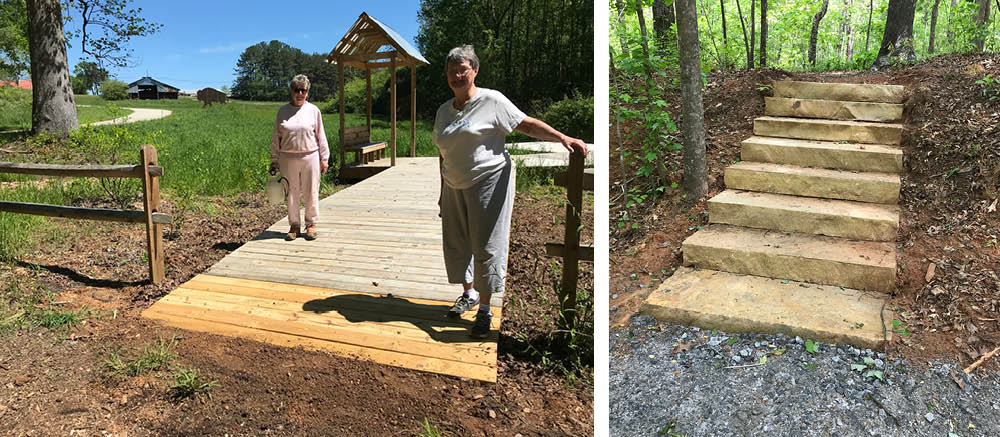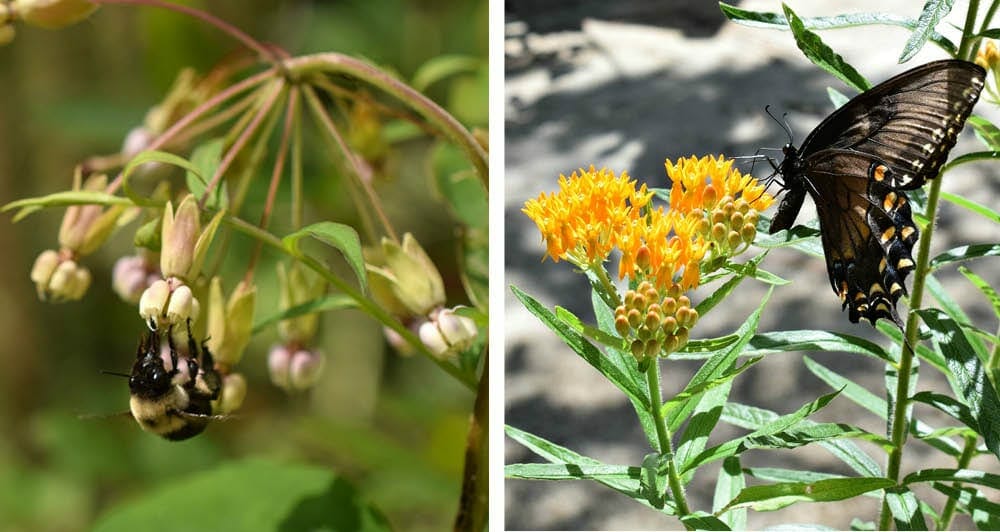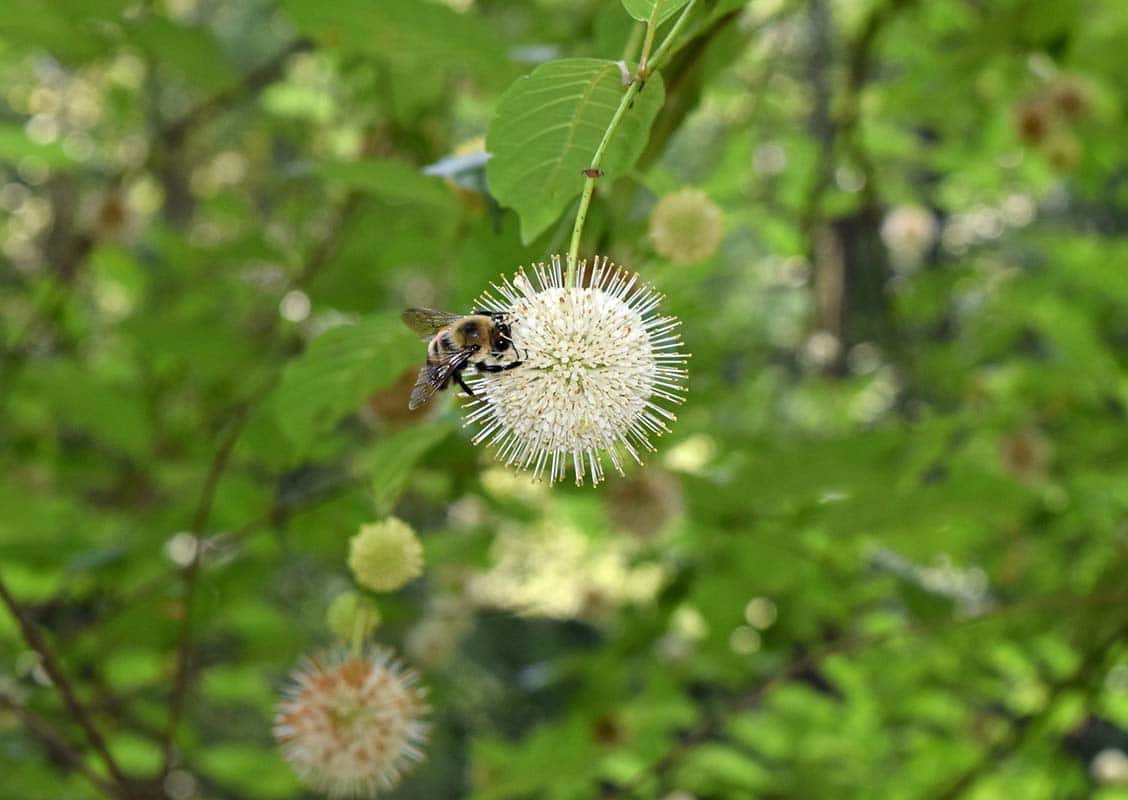Upcoming events
We will not have a July meeting and educational program in Atlanta, since it is a busy time with vacations and outdoor activities. Some of those activities will include more GNPS field trips and workshops, so watch for them. Recent activities have filled up quickly, like the June 1st event Birds and Natural Communities Workshop at Cascade Springs and the June 8th Native Plant Nursery Visit and Educational Walk, but more offerings will pop up. .
Summer is also a great time to roam around the state and visit other GNPS chapters. Check out activities at their web sites and social media outlets:
GNPS will be participating in the National Pollinator Week Kick-Off Mini-Festival held by Beecatur on June 15. Check it out, along with the other activities of National Pollinator Week. And last but not least, the Cullowhee Native Plant Conference runs from July 17-20, and it is not too late to register.
Chapter News: West Georgia
Frank Bennett

The Buffalo Creek Trail has had two major improvments, a handicapped-accessible ramp and new stone steps.
This spring saw several enhancements to the Buffalo Creek Trail as members continue to expand native beds and eliminate invasives. A ramp has been added to the meadow boardwalk making it handicap accessible. People using the Carrollton Greenbelt Path are now able to roll a wheelchair over to gain a closer view the plantings surrounding them. In addition, an old wooden path leading towards the Azalea Trail has been replaced with a set of stone steps with a handrail soon to follow. While constantly trying to make the nature trail more plant diverse, the chapter is also making it accessible to more people. In the coming month, additional river rock will be placed near the boardwalk, and split-rail fencing will be installed around the pollinator meadow. Funding for the fence, rocks, and stone steps is provided by a Carroll EMC grant written by past chapter president, Marc LaFountain.
Ann Ethridge gave a tour of Buffalo Creek to over twenty members of the Spade And Trowel Garden Club. Ben de Mayo and Kent Johnston, Superintendent of Parks, also sponsored a public Wildflower Walk along the trail. On June 5th Ann Ethridge, Diane Rooks and other members will participate in the summer “Camp Dirty Knees” sponsored by the local Master Gardeners. Between thirty and forty children will tour Buffalo Creek Trail. Each one will be instructed how to plant their own cardinal flower and learn the benefits they provide to insects and hummingbirds.
The GNPS Plant of the Year is doing well in West Georgia, as are some eastern swallowtails.
On June 18, the chapter hosts a program by member Fran Forsyth of Cedartown. Her topic will be “Medicine and Food From Native Plants,” highlighting species commonly found on rescues and well suited to the northwest Georgia region. More details are available at the WGC website www.wgawildflowers.org. Plant Spotlight: Milkweeds for Your Garden
Ellen Honeycutt

Although monarch butterflies and their dependence on milkweek foliage get most of the attention, other pollinators like bees and tiger swallowtails also enjoy milkweed nectar.
If you like to garden for butterflies, you have probably been persuaded that some type of milkweed (Asclepias spp.) should be in your garden, so that monarch butterflies can lay eggs on it to grow the next generation. I, too, think that you should have milkweed in your garden, but — in this time of appreciating all pollinators and the role they play — you should know that milkweed blooms support many different kinds of pollinators, from bees to other butterflies. We recently shared a post on Facebook showing the many different butterflies enjoying the blooms of sandhill milkweed (Asclepias humistrata). You can view the post even if you don’t have Facebook by clicking on the post link, then clicking on the picture you see and use the arrow key to flip through the pictures.
Georgia is home to at least 23 species of milkweed throughout the state, from high in the North Georgia mountains to deep into the Coastal Plain. We can appreciate many of these species as we wander and hike through natural areas. I love to find the mountain species like the petite fourleaf milkweed (Asclepias quadrifolia) and the tall poke milkweed (A. exaltata) as well as the Coastal Plain species like the unique-patterned sandhills milkweed (A. humistrata) and the vibrantly-colored few-flower milkweed (A. lanceolata).

Two of the many milkweeds suitable for your garden include swamp milkweed (Asclepias incarnata var. pulchra, left) and white (also called red-wing) milkweed (A. variegata, right).
When it comes to buying milkweed for your garden, of course we are limited to what nurseries are willing to propagate, so you’re probably going to see only certain species. Luckily, one of the most commonly sold ones is also one of the most appropriate: the orange butterflyweed (A. tuberosa). Another commonly sold one is swamp milkweed (A. incarnata), although it is mostly native to north Georgia. An excellent resource for learning about Georgia milkweeds is a brochure that was created with the knowledge and efforts of the best milkweed experts in Georgia. You can find a link to a downloadable copy of the brochure at the State Botanical Garden web site and also in my April blog: Milkweeds in Georgia.
Since I live in North Georgia, one of my favorite milkweeds is poke milkweed (A. exaltata); it is one of the first species to emerge and have foliage available to monarch butterflies that come through in April. Other people have good luck with swamp milkweed being early. Orange butterflyweed is one of the last species to come back in the spring. Part-shade gardens can benefit from using white milkweed (A. variegata), also called red-ring milkweed.
Monarch butterflies lay eggs in Georgia in spring (April/May) on their northward journey and late summer (August/September) on their southward migration. I recently read an article here that suggests that gardeners rejuvenate their milkweed by cutting it back in late June or early July to get fresh foliage for them. I’m going to try that on a few of my more bedraggled plants this summer; be sure to keep them well hydrated if you do it, and always keep them pesticide free. Every garden makes a difference in our efforts to support native insects and butterflies.
The Great Georgia Pollinator Census
Ellen Honeycutt

Buttonbush (Cephalanthus occidentalis) will be one of the plants frequented by pollinators in August.
A new citizen science project is coming up, especially for Georgians. The Great Georgia Pollinator Census will be August 23-24, 2019 and will require just 15 minutes of your time. Get your family and friends involved as well — it is designed for Georgia citizens, of all ages, to participate. School groups, garden groups, families, as well as individuals are encouraged to be a part of the project. You are welcome to count more than once during those two days and turn in multiple forms.
Do you need a big garden to do it? No, you just need one blooming flower that attracts insects and you will count and identify the insects that land on that for 15 minutes. Do you have to be super smart to do it? No, the categories are fairly easy: You will be asked to categorize the insects you see into these categories: native bees like bumble bees, carpenter bees, and small bees; non-native honey bees; wasps; flies; butterflies/moths; and any other insect.
For more information, including a counting form, insect identification guides, and other resources, check out the official webpage for the project: https://ggapc.org/ There is also a Facebook group page where you can ask questions and see resources shared by others. In our efforts to support our native pollinators, helping to provide data like this throughout the state is important. Grab the kids, the grandkids, or a good friend and let’s get counting! |